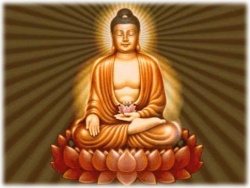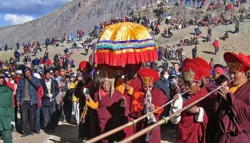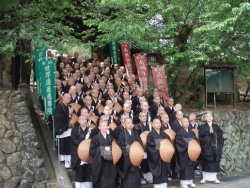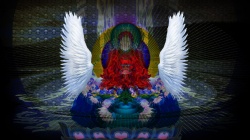Dharmodgata
Dharmodgata
曇無竭菩薩 (Skt; Jpn Dommukatsu-bosatsu)
Also known as Dharma Emerged or Dharma Arisen. A bodhisattva described in the Wisdom sutras.
According to the Larger Wisdom Sutra, Bodhisattva Dharmodgata lived in his palace in the City of Fragrances (Skt Gandhavati).
While satisfying the five desires and being accompanied by sixty-eight thousand women, he preached the doctrine of the perfection of wisdom three times a day. The people in the city held him in high esteem and presented him with offerings.
Those who listened to his sermon and embraced it were saved from falling into the evil paths of existence.
From Dharmodgata, Bodhisattva Ever Wailing learned the teaching of the perfection of wisdom, mastered six million types of meditation, and finally attained supreme wisdom.
In the Wisdom sutras, Bodhisattva Dharmodgata is described as a "good friend" who leads Bodhisattva Ever Wailing to enlightenment in lifetime after lifetime.
Dharmodgata (曇無竭, 4th–5th centuries) was from Huanglong (黃龍), present-day Chaoyang (朝陽), Liaoning Province, and his family name was Lee. He became a novice Monk when he was just a child. He studied hard, observing The Precepts and reciting sūtras, and was well regarded by his teachers.
Inspired by the example of Dharma master Faxian (法顯, circa 337–422), who went to India in 399 and brought back Sanskrit texts in 413, Dharmodgata vowed to seek the Dharma even at the cost of his Life.
In 420, the first year of the Yongchu (永初) years of the Liu Song Dynasty (劉宋, 420–79), Dharmodgata set out for the western country, together with twenty-five Monks who shared his aspiration. They carried with them banners and Ritual objects for Making Offerings as well as Food and utensils.
The team passed Khocho (高昌, in present-day Turfan Prefecture, Xinjiang, China), Kucha (龜茲, or 庫車, in present-day Aksu Prefecture, Xinjiang, China), and other kingdoms. Only thirteen members of the team survived climbing a cliff on their way.
After crossing the snow mountain, they arrived in Kophen (罽賓, an ancient kingdom, also called Gandhāra, in present-day Kashmir, northern Pakistan, and eastern Afghanistan area).
They made obeisance to The Buddha’s begging bowl and received the Sanskrit text of the Sūtra of the Prophecy Bestowed upon Avalokiteśvara Bodhisattva (T12n0371).
The team stayed there for over a year, learning Sanskrit and studying Sanskrit texts.
The team continued on west and visited the Yuezhi country (月氏, the moon people, an Indo-European people,
who had established the Kushan Empire, which at its height stretched from what is now Tajikistan to Afghanistan, Pakistan, and down into the Ganges river valley in northern India),
where they paid homage to a relic of The Buddha, His head bone.
Then they went to northern India, present-day Pakistan, and stayed at the Pomegranate Temple for three months, passing the summer.
At this temple in India, Dharmodgata accepted the complete monastic precepts and became a fully ordained Monk.
Trudging south toward Śrāvastī in central India, Dharmodgata and his team crossed unforgiving terrain and relied on sugar for Food. Only five of the thirteen-member team survived the ordeal.
Throughout the hardships, Dharmodgata never forgot the Sūtra that he was carrying with him.
By invoking Avalokiteśvara Bodhisattva’s help, Dharmodgata and his surviving team escaped the perils of raging Elephants and then of buffaloes.
The team continued to travel in India for several years, paying homage to the sacred sites of The Buddha and visiting with illustrious masters.
Finally, departing from southern India, they undertook their return journey by sea, aboard a merchant ship.
Crossing the Indian Ocean and the South China Sea, they safely arrived in Guangzhou (廣州), Guangdong Province.
Dharmodgata stayed in that area, propagating the Dharma until his Death.
It is remarkable that Dharmodgata had gone to India, seeking the Dharma, about two hundred years earlier than Dharma Master Xuanzang (玄奘, 600– or 602–64).
However, his book on his adventurous Pilgrimage had been lost.




